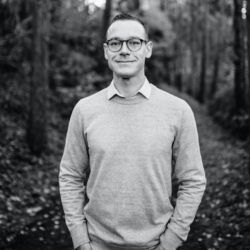When 36-year-old director Mati Diop walked into the Grand Théâtre Lumière at the premiere of her film, Atlantique, she received loud applause and celebration. The applause erupted again as the credits rolled, the audience responding in praise in the wake of this haunting romantic fairytale. Diop is the first black woman to have a film in competition at Cannes, and her debut feature is the work of a confident, perceptive filmmaker. An actress most known for her role in Claire Denis’ 35 Shots of Rum, Diop’s directorial and writing abilities (she shares a screenplay credit with Olivier Demangel) feel much more mature and capable than a first film. Diop is like a building wave of creativity rushing forward towards a bright future.
Atlantique is a fever dream of a ghost story, combining magical realism with conventional romance. Set in the Senegalese city of Dakar, the environment is a bricolage of traditions and modernity, urban decay and natural beauty. In the opening shots, we see a massive futuristic tower under construction; the polluted skies surrounding the site draw comparisons to the Blade Runner films. The workers on this building have not been paid for over three months, and the young men demand their wages from their corrupt employer. When it appears as if justice will not be done, the men secretly take off by boat into the Atlantic waves, en route for Spain in hopes of a better future.
One of these workers, Souleiman (Ibrahima Traoré), is reluctant to leave his lover, Ada (Mama Sané). Their romance prompts the narrative’s crises and tensions, a Romeo and Juliet of impossible love. The 17-year-old Ada is betrothed to another man, Omar (Babacar Sylla), a person of wealth and local prestige. Ada’s traditional and religious friends view Ada’s promiscuity disparagingly, while her other “wilder” friends are just excited about Omar’s fancy house and Ada’s chic all-white bedroom. In this, Atlantique is a fairly mainstream coming-of-age love story: here is a young woman caught between two suitors, trying to navigate various expectations and roles placed upon her by family, religion, and society, all while discovering her own sense of identity and purpose. It is the transition from girlhood into womanhood, and Ada must make the leap.
Yet Atlantique takes a turn towards the fantastical on Ada and Omar’s wedding night—a mysterious fire of unknown origins appears in the new couple’s bedroom, prompting a police investigation and plenty of unease. Has Souleiman returned from his ocean voyage, enacting revenge upon his lost love? Without giving away the narrative details, I will simply answer in the affirmative, albeit with all sorts of caveats as to what “returned” means for these star-crossed lovers. While the allusions to Romeo and Juliet are appropriate, the 1973 Senegalese film from Djibril Diop Mambéty, Touki Bouki, is the stronger comparison. That film follows two young lovers on their journey out of Dakar to a new life in France, only to have the love of homeland bring about their separation. Indeed, Mati Diop is the niece of Mambéty, and it’s as if she is possessed by the spirits of her relatives within her own work.
For a film made by a woman about a group of women, Atlantique is surprisingly male-centric in its narrative emphases and themes. Even as the friendships between the young women are significant, so much of the dialogue is about the boys—where they went, why’d they go, if they’re back, etc. I even wondered if the film would pass the Bechdel Test: Does the film include two female characters who talk to each other about something other than a man? (Not that a film has to pass that test in order to be good art). Apart from Souleiman, the other boys’ roles and the explanation as to their disappearance (and reappearance) is mostly unaffecting and muted; even when tragedy strikes, there is little in the way of mourning or tension, as the boys have no distinct identities other than “the boys.” The central (albeit supporting) role of a young police investigator doesn’t have the same spirit or sincerity as the other performers. This is most noticeable when Traoré and Sané are on screen together; they’re simply captivating, and Diop draws out wonderfully authentic performances from these young actors.
The ocean horizon where sea and sky touch is a prominent and appropriate visual motif in Atlantique. Every shot of the sea is framed slightly different; the combination of sunlight and the haze of Dakar’s skies elicits a myriad of colors—blues, browns, pinks, purples—which fade and blur together in dreamlike evanescence. The horizon is both a limitation and an invitation, a barrier to be breached and a hopeful port of call. With Atlantique, these are new horizons for both Ada and Diop, and I’m confident both will reach their desired destinations.

